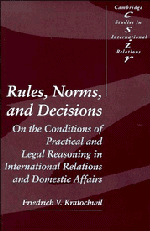 Rules, Norms, and Decisions
Rules, Norms, and Decisions Book contents
- Frontmatter
- Contents
- Acknowledgements
- Introduction: The resort to norms
- 1 Rules, norms, and actions: laying the conceptual foundations
- 2 Anarchy and the state of nature: the issue of regimes in international relations
- 3 The emergence and types of norms
- 4 The force of prescriptions: Hume, Hobbes, Durkheim, and Freud on compliance with norms
- 5 The discourse on grievances: Pufendorf and the “laws of nature” as constitutive principles for the discursive settlement of disputes
- 6 The notion of “right”
- 7 The question of “law”
- 8 The path of legal arguments
- Conclusion: The international legal order, international systems, and the comparative analysis of the practice of states
- Notes
- Index
2 - Anarchy and the state of nature: the issue of regimes in international relations
Published online by Cambridge University Press: 01 June 2011
- Frontmatter
- Contents
- Acknowledgements
- Introduction: The resort to norms
- 1 Rules, norms, and actions: laying the conceptual foundations
- 2 Anarchy and the state of nature: the issue of regimes in international relations
- 3 The emergence and types of norms
- 4 The force of prescriptions: Hume, Hobbes, Durkheim, and Freud on compliance with norms
- 5 The discourse on grievances: Pufendorf and the “laws of nature” as constitutive principles for the discursive settlement of disputes
- 6 The notion of “right”
- 7 The question of “law”
- 8 The path of legal arguments
- Conclusion: The international legal order, international systems, and the comparative analysis of the practice of states
- Notes
- Index
Summary
THE DOMESTIC ANALOGY, REGIMES, AND SOCIAL ORDER
The place of norms in political life has always been controversial, particularly in international relations analysis. The common-sense assumption that “law” begets order and that consequently disorder has to result from either the absence of a normative structure or the ineffectiveness of enforcement seems to have exercised such a powerful hold that people conceived of international politics largely in terms of a negative analogy to domestic politics. The conceptual blinders are so well established that traditionally persons interested in the study of international relations had to group themselves into two virtually exclusive “fraternities.” Those who denied that norms are important for international interactions called themselves – with typical modesty – “realists,” and those who were interested in norms were labeled “idealists.” The advocacy of law among the latter group could then be based on either hopes for a world government, the establishment of peace through law, or on the often somewhat embarrassed admission that international law, although useful for certain purposes, was not really “law.” In any case, the underlying dichotomy between domestic (law-governed) and international affairs (anarchy) appeared to be reinforced. World government advocates therefore shared with the realists a common Hobbesian framework. The latter, however, did not account for two major issues: first, the problem of how norms and institutions in general influence decisions and thus create social order, and second, whether and how order is possible in the anarchical realm of international relations.
- Type
- Chapter
- Information
- Rules, Norms, and DecisionsOn the Conditions of Practical and Legal Reasoning in International Relations and Domestic Affairs, pp. 45 - 68Publisher: Cambridge University PressPrint publication year: 1989
- 1
- Cited by
